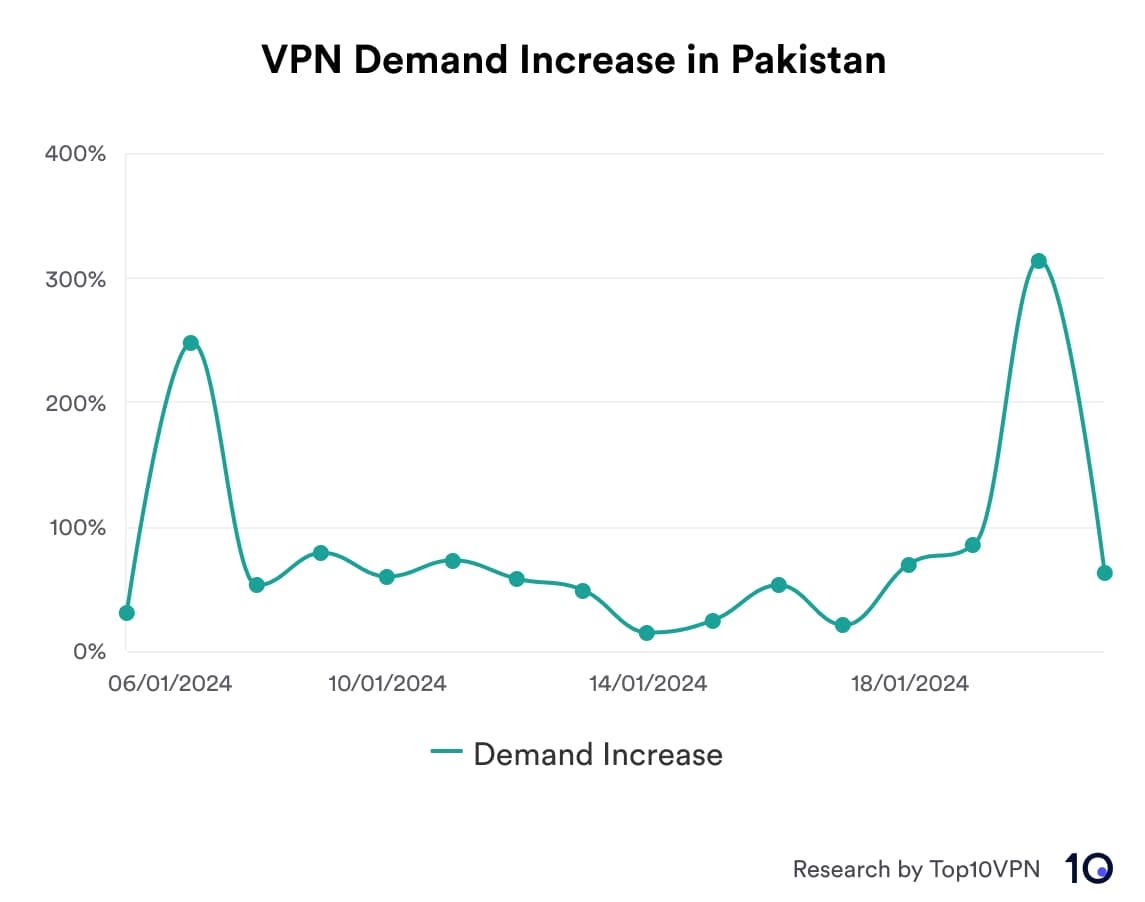Friday Digest #9: Internet Restrictions in Pakistan
Hi, it’s Sam. Welcome to our last newsletter of January, it’s been a long month.
This week, we’ll take a look at what’s been happening online in Pakistan, where elections are scheduled for February 8th, and explore what might be in store in the coming weeks.
Over the last few weeks, there have been three separate internet outages in Pakistan, with access to social media platforms blocked on December 17, January 7 and January 20.
Given each of the restrictions coincided with virtual rallies hosted by Imran Khan’s opposition party, they certainly appear to be part of the unprecedented suppression of one of the country’s most popular political parties.
The internet has become a crucial tool for Imran Khan’s PTI party after his name was banned from mainstream media. And they’re not just facing social media restrictions — this week, access to their official website also appears to have been blocked.
Despite the heavy restrictions, there’s evidence that many people have been able to find workarounds. During the most recent restrictions, for example, we recorded a 200% increase in demand for VPN apps.
It’s far from the first time Pakistan has restricted access to the internet. Last May, authorities implemented an internet blackout that lasted for four days following the arrest of Khan, costing the country more than $150 million according to our Cost of Internet Shutdown research.
Worryingly, the government has argued the most recent interruptions weren’t intentional but due to technical issues and said that there’s "no guarantee that such incidents would not occur in the future." Meanwhile, an official from the Pakistan Telecommunication Authority has said disruptions could continue “for the next two to three months.”
However, there has been some positive developments. This week, a legal petition was filed with the Sindh High Court (SHC) calling for an end to the disruptions.
The petition, filed by independent candidate Jibran Nasir, said the disruptions were a “violation of our fundamental human rights” and that they are “not just stopping the PTI from contesting free and fair elections — which is pre-poll rigging — but is also hindering the way of independent candidates like me.”
In response, the Court has urged the government and telecommunication authorities to maintain uninterrupted access to the internet until the election.
Legal challenges have proved successful in ending internet shutdowns in several countries in the past. But the government’s denial of the restrictions being politically motivated may indicate they are willing to continue the draconian practice going forward.
We’ll continue to monitor the situation in Pakistan and provide updates on any significant developments as the election approaches.
What We’ve Been Reading
The Independent: Sri Lanka passes bill allowing government to remove online posts and legally pursue internet users
Sri Lanka's parliament has passed a controversial internet regulation bill, criticized for potentially stifling free speech, which allows the government to remove online posts and pursue internet users legally. The move comes amid the country's severe economic crisis and ahead of a presidential election, raising concerns about its impact on digital freedoms and political dissent.
404 Media: Inside a Global Phone Spy Tool Monitoring Billions
A 404 Media investigation has revealed that hundreds of thousands of ordinary apps, including well-known ones like 9gag and Kik, are part of a global surveillance system that begins with in-app ads and results in users being tracked by a mass monitoring tool called Patternz. This tool, advertised to national security agencies, can track physical locations, hobbies, and family members of people to build billions of profiles, with Google and other ad firms implicated in the data supply chain.
The Register: Amazon Ring sounds death knell for surveillance as a service
Amazon Ring has announced it’s discontinuing its Request for Assistance (RFA) tool, which allowed law enforcement agencies to request video footage from Ring users without a warrant. This decision, affecting users in the U.S. where the Neighbors app operates, is a positive step but concerns remain about ongoing police requests for Ring footage without warrants.
Bleeping Computer: UK says AI will empower ransomware over the next two years
The UK's National Cyber Security Centre (NCSC) warns that artificial intelligence (AI) will significantly empower ransomware and other cyberattacks over the next two years. AI is expected to enable even inexperienced hackers to conduct more effective attacks, with cybercriminals already using AI to enhance operations like reconnaissance and phishing, and specialized AI services being developed to support criminal activities.
Open Data Institute: PETs in Practice
The Open Data Institute (ODI) has developed a series of explainers on privacy-enhancing technologies (PETs), focusing on their real-world applications. One such example is the use of multi-party computation (MPC) by the Boston Women’s Workforce Council and Boston University, which enabled companies to collectively compute payroll data for a pay equity report without revealing individual contributions.
Tools of the Week
Yarrpbox is a tool designed for rapid, large-scale internet scanning and middlebox detection, building upon the features of Yarrp and incorporating new techniques. It supports various probe types for both IPv4 and IPv6, and includes an offline post-processing utility, yrp2warts, for analyzing scan results, with the ability to output data in text or JSON formats.
Pulse Meter is designed for parsing the System Snapshot from an Ivanti Connect Secure appliance to identify possible Indicators of Compromise (IOCs) related to specific vulnerabilities, namely CVE-2023-46805 and CVE-2024-21887. It aims to assist in detecting malicious activity, although it may have limitations in coverage and could raise false positives, and the developers encourage contributions from more experienced defenders to enhance its detection logic.






